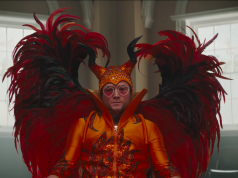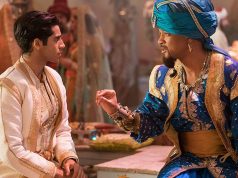There is so much lunacy in “Charlie and the Chocolate Factory” that reaction shots seem to comprise half the film: Willy Wonka reacting to the loathsome children, Grandpa Joe reacting to Willy Wonka’s wonkiness, Violet Beauregarde’s mother reaction to her daughter’s ferocious competitiveness, and so on. What’s going on is pretty weird, and that fact is not lost on any of the characters.
It seems a perfect fit to have Tim Burton direct Johnny Depp in an adaptation of Roald Dahl’s novel; like Kenneth Branaugh and Shakespeare, they go hand-in-hand. Certainly Burton’s fondness for telling darkly comic stories and Depp’s knack for playing off-kilter recluses are useful here.
Willy Wonka, as you surely know, is the enigmatic genius whose massive factory produces the world’s most popular candy even though no one is ever seen entering or leaving the building. He has issued an invitation, though, to let five children and one parent or guardian each tour his factory, led by him personally. These invitations are issued randomly in the form of Golden Tickets hidden under the wrapper of five Wonka chocolate bars. All the world wants those Golden Tickets.
The lucky winners are soon revealed: Augustus Gloop (Philip Wiegratz), a waxy-faced, obese German boy whose porcine mother lets him live on a diet of chocolate; Veruca Salt (Julia Winter), spoiled rich girl whose Daddy buys her everything (I love the brief glimpse of her exasperated mother sucking down a martini); Violet Beauregarde (Annasophia Robb), champion gum-chewer and all-around trophy-winner, whose mother (Missi Pyle), in a pink jogging suit that matches her own, has the plastic face of a former Miss America; and Mike Teavee (Jordan Fry), ordinary American kid who watches TV all day, and who, in this update, loves video games, too.
At last there is our hero, humble Charlie Bucket (Freddie Highmore), who lives with his impoverished parents and all four grandparents in a dilapidated shack on the outskirts of what appears to be London. The grandparents are confined to bed, and notice “bed” is singular; Dad (Noah Taylor) works at a toothpaste factory; Mom (Helena Bonham Carter) keeps house, what little there is to keep, and makes cabbage soup for dinner. They are very happy, but very poor. When good-hearted Charlie finds the last Golden Ticket, he suggests selling it rather than using it, since they could probably get good money for it and heaven knows they need money.
But the family refuses, and Charlie chooses his Grandpa Joe (David Kelly) — who dances a merry jig indeed when Charlie shows him the ticket — to accompany him to the factory. There they meet the other winners, their parents, and of course Mr. Wonka. With a pageboy haircut, pale skin, nervous giggle, and a general uneasiness around other humans, Wonka is like a more sarcastic and less pedophilic version of Michael Jackson. But then, with his abrupt changes in conversation, seemingly haphazard approach to his factory, and random usage of out-moded slang, he could also be a more low-key version of the Genie in “Aladdin.” Depp has taken the blithe character depicted in the book and inflated him to full Deppth, as quirky, funny and unapproachable a character as he has ever played.
The film is a marvel of production design, from the impossibly tilted Bucket home to all the wonders of the Wonka factory. Of course Burton has never allowed his production designers (Alex McDowell in this case) to skimp, and his technical advisers got a workout, too: All of the Oompa-Loompas (the tiny race of people who work in Wonka’s factory) are played by one guy, Deep Roy, duplicated dozens of times, as necessary, to create the illusion of an entire population. Why do that instead of using multiple actors? You’d have to ask Burton, but I suspect the answer is, “Because it’s more fun this way.”
Freddie Highmore, previously seen with Depp in “Finding Neverland,” is a compelling little actor, with intelligent, expressive eyes and a face that absolutely radiates joy when his character is happy. You can see why Depp was so impressed with him after “Neverland” that he recommended him to Burton.
What’s missing from the whole thing, just slightly, is warmth. This is not a very personable movie. An attempt has been made by screenwriter John August to give Willy Wonka a backstory, but it doesn’t soothe the sting of his often hilarious disdain for children and their parents. You laugh at it, sure, but only from a distance. You never think, “Gee, I’d like to go there,” or “Hey, that Willy Wonka seems like a fun guy to hang out with.” Seeing Willy Wonka — a candymaker, beloved by all children — behave so off-puttingly is sort of like finding out Dr. Seuss hated kids or that Santa Claus considers his job drudgery. You want there to be an underlying kindliness, and this Wonka doesn’t have it.
B (1 hr., 55 min.; )





